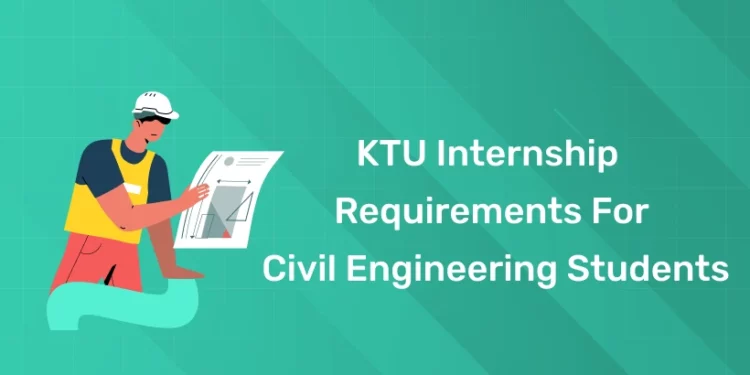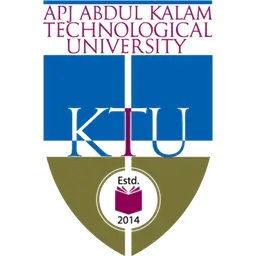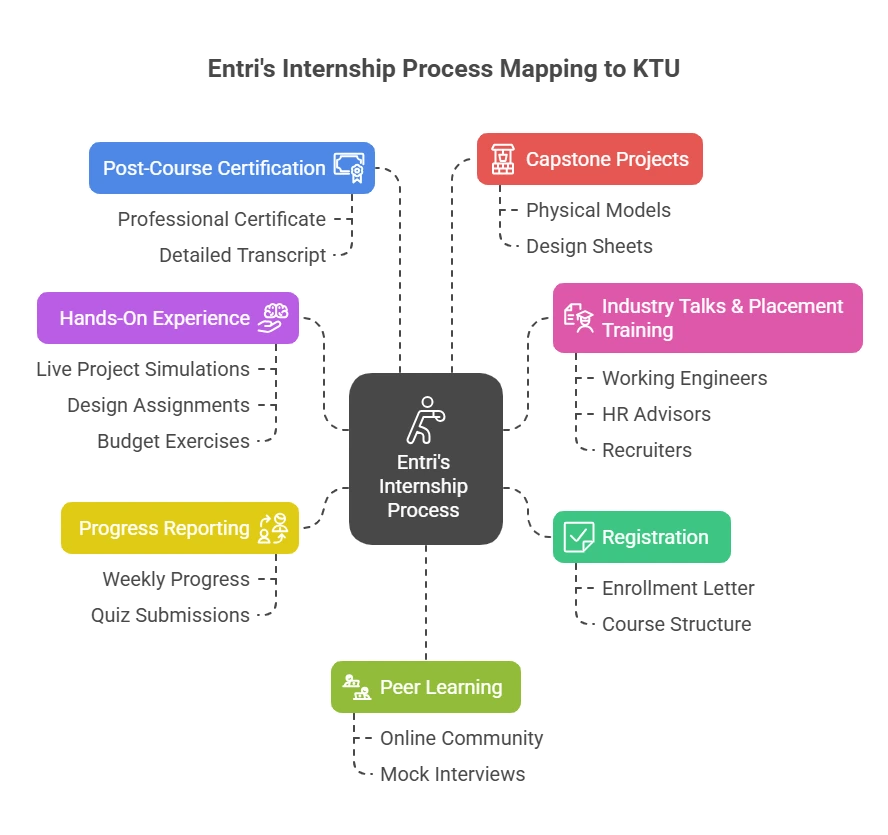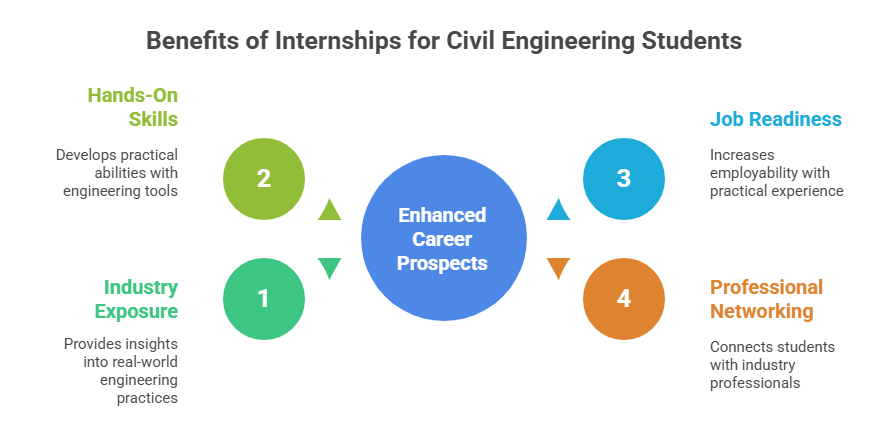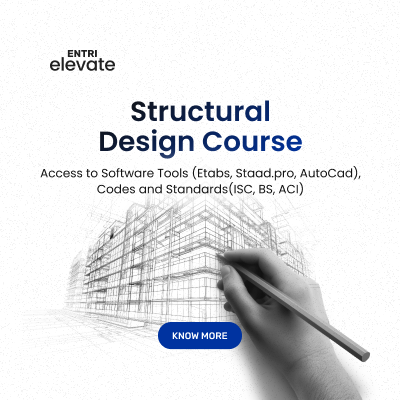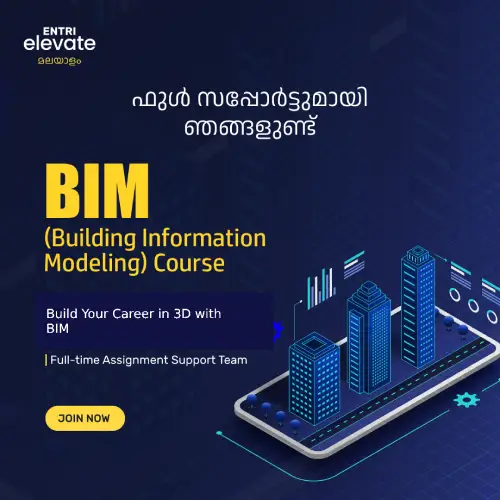Table of Contents
Key Takeaways:
- KTU mandates a 4–6 week internship for all civil engineering students.
- Entri’s Civil Skilling Courses offer a robust, flexible alternative.
- Fields like MEP, BIM, QS, and Structural Design are in high industry demand and covered in-depth by Entri.
- These courses are internationally certified, align with KTU’s internship requirements, and provide key practical skills.
- Entri supports every stage, registration, learning, reporting, and certification, making completion seamless and universally valuable.
Securing a successful career in Civil Engineering demands more than theoretical knowledge, you must also prove your abilities in real-world scenarios. Recognizing this, APJ Abdul Kalam Technological University (Kerala Technological University, or KTU) has built mandatory internships into its B.Tech Civil Engineering curriculum. These internships provide a bridge between academia and the professional world, enabling students to step into the industry with both confidence and competence.
Yet, many students find the traditional internship process challenging, like limited slots, geographic constraints, and the need to demonstrate advanced skills in a rapidly modernizing field. Enter Entri’s Civil Skilling Courses, a dynamic solution that combines rigorous, internationally certified online training with the practical expertise KTU requires.
In this comprehensive guide, we’ll detail KTU’s internship requirements for civil engineering students, break down the step-by-step process, and show you why Entri’s evolving suite of civil engineering courses offers a smart, efficient, and globally recognized way to fulfill (and exceed) those requirements.
Duration and Types of Civil Engineering Internships at KTU
KTU students must complete an internship lasting 3 to 6 weeks. Two primary routes exist:
A. Industrial Internship
Here, students work directly with construction companies, consultancy firms, architectural organizations, public works departments, or infrastructure corporations. Activities include:
-
On-site visits and project supervision
-
Learning about materials testing and quality control
-
Cost estimation and billing
-
Surveying, planning, and scheduling
-
Exposure to site safety and environmental regulations
Master MEP Design with Industry-Leading Training!
Gain in-depth knowledge of Mechanical, Electrical, and Plumbing (MEP) Design with expert-led courses. Learn HVAC, fire safety, sustainable building strategies, and BIM applications to excel in the construction industry.
Know MoreB. Research Internship
For those interested in the academic, R&D, or innovation side of civil engineering, research internships with premier institutions or labs allow you to:
-
Participate in cutting-edge studies related to new materials, seismic design, green construction, etc.
-
Collaborate on publications or technical reports
-
Use advanced modeling and analytical software
Both paths are designed to align with civil engineering’s broad and evolving professional landscape.
KTU Internship Process: Step-by-Step
Step 1: Pre-Internship Preparation
-
Department Registration: Begin by registering your interest with the Civil Engineering Department.
-
Application Form: Submit a formal application; specify your preferred organization, objectives, and proposed learning outcomes for the internship.
-
Resume/CV: A well-crafted, professional resume detailing academic achievements, project involvements, and technical proficiencies.
-
Faculty Recommendation: A letter from a trusted faculty member boosts your credibility and chances of acceptance.
Master MEP Design with Industry-Leading Training!
Gain in-depth knowledge of Mechanical, Electrical, and Plumbing (MEP) Design with expert-led courses. Learn HVAC, fire safety, sustainable building strategies, and BIM applications to excel in the construction industry.
Know MoreStep 2: Internship Approval
-
The department will vet your application, ensuring that your intended role aligns with curriculum goals and KTU’s professional standards. Approval is mandatory before you begin.
Step 3: Undertaking the Internship
Throughout your placement, you will:
-
Regularly report progress to your assigned faculty and organization supervisor.
-
Perform practical work across domains such as:
-
Site Management (coordinating workers, managing resources, ensuring quality)
-
Surveying (using total stations, GPS, and traditional methods)
-
Structural Analysis & Design (modeling using STAAD Pro, ETABS, or BIM)
-
Project Planning (Gantt charts, resource allocation)
-
Step 4: Post-Internship Documentation and Assessment
On finishing your internship, you’ll need to submit:
-
Internship Report: A comprehensive document covering projects handled, problems solved, and lessons learned.
-
Skill Documentation: A summary of new technical and professional skills developed.
-
Host Company Evaluation: Feedback and an evaluation form from your on-site supervisor.
-
Faculty Feedback: Your academic guide will provide assessment and guidance based on your report and supervisor’s comments.
Guidelines: What Makes a “KTU-Approved” Internship?
KTU has specific guidelines that every internship must adhere to:
-
Direct Relevance: The internship should sharpen your civil engineering competencies, construction management, site supervision, structural and infrastructure design, surveying, or the use of modern tools like BIM or project management applications.
-
Approved Providers: Eligible internships can be pursued at government departments (PWD, urban planning), private or public construction/consultancy firms, architectural agencies, or research laboratories.
-
Certification Requirement: On successful completion, students must receive an internship certificate, which should be included in their academic records and resume.
Entri’s Civil Skilling Courses: A Smart Way to Fulfill Internship Requirements
Entri gives KTU students a powerful alternative (and supplement) to traditional on-site internships. Its suite of Civil Skilling Courses, each internationally certified, delivers market-ready exposure and the practical expertise KTU demands.
Why Choose Entri for Your KTU Internship?
A. Flexibility and Accessibility
-
Study at your own pace; location isn’t a constraint.
-
Begin courses as soon as you meet KTU’s eligibility, with no long waits for company response.
-
Balance academic assignments with skill-building, keeping your semester on track.
B. Global Industry Certifications
All Entri courses offer certification recognized both locally and internationally, a valuable addition to your CV that demonstrates both contemporary skills and initiative.
C. Direct Alignment with Industry Needs
Courses are curated and taught by experienced industry professionals, ensuring that students are learning what civil engineering employers actually seek in new hires.
Entri’s Top Civil Skilling Courses
1. MEP Engineering (Mechanical, Electrical, Plumbing)
-
Course Highlights:
-
Planning HVAC, fire-fighting, plumbing, and electrical layouts
-
System installation principles
-
Real-world project cases
-
Estimation and tendering for MEP works
-
-
Internship Value:
Gaining MEP skills builds a sharp competitive edge: The majority of commercial real estate and infrastructure projects require well-trained MEP engineers. Students are exposed to complex coordination tasks, a vital requirement in many advanced construction firms. -
Why Choose It for Internships?
In a market where MEP skills are in high demand for smart buildings, this course not only meets requirements but boosts employability. Expand your portfolio with real projects, networking via Entri’s community, and even LORs (Letters of Recommendation) for performance.
2. Building Information Modeling (BIM)
-
Course Highlights:
-
Mastering BIM software for 3D modeling, project simulation, and collaborative design
-
Managing multidimensional data for efficient project delivery
-
Workflow optimization and clash detection with virtual project test drives
-
-
Internship Value:
Increasingly, both global and Indian construction companies expect interns to have a working knowledge of BIM. proficiency. This course ensures you can step directly into tech-forward environments that use BIM for everything from highways to skyscrapers.
3. Quantity Surveying (QS)
-
Course Highlights:
-
Cost estimation and project budgeting
-
Tendering and contract management
-
Practical QS software (like MS Excel, Candy, or CostX)
-
Bill of Quantities (BoQ) and materials take-offs
-
-
Internship Value:
Cost and resource control is the backbone of every project. This course empowers you with skills that are always in short supply, making it easier to land site, office, or consultancy-based internships.
4. Structural Design
-
Course Highlights:
-
Real-life structural system modeling using advanced software
-
Analysis of RCC and steel structures
-
Earthquake and wind load considerations
-
Detailed design documentation
-
-
Internship Value:
Structural design is the heart of civil engineering. This course helps students walk onto construction sites or into design offices, able to meaningfully engage with senior engineers from day one.
Overall, Entri’s courses are a smart fulfillment strategy: They offer flexibility, certifications, and skills that exceed basic internships. With 1000+ placements, they’re a pathway to careers. KTU students can submit course completions for credits, especially if combined with short on-site stints.
Mapping Entri to KTU’s Internship Process
Registration:
Entri provides documentation (enrollment letter, course structure) to submit for departmental approval, just like a traditional internship.
Hands-On Experience:
Live project simulations, design assignments, and budget exercises directly map to the “practical” criterion set by KTU.
Progress Reporting:
Weekly progress and quiz submissions can be reported to your academic supervisor.
Post-Course Certification:
On successful completion, you receive a professional certificate (internationally valid) and a detailed transcript to attach with your internship report.
Capstone Projects:
Practice solving actual engineering cases by building physical models or detailed design sheets.
Peer Learning:
Join a vibrant online community for doubt-solving, networking, and mock interviews.
Industry Talks & Placement Training:
Regular sessions with working engineers, HR advisors, and recruiters from partner organizations.
Advantages of Entri Civil Skilling Courses in Fulfilling KTU Internship
-
Wider Choice: The freedom to pick fields you are truly interested in, structural, BIM, MEP, QS, or a blend.
-
Current Curriculum: Courses are updated regularly to reflect new software standards, industry codes, and practical design trends.
-
Interview Readiness: With real project skills, students are far better placed to clear campus placements and industrial interviews.
-
Global Exposure: Courses often include comparative practices and insights into international standards (British, Euro, American Codes).
-
Academic Performance: Students with advanced practical skills often perform better in future coursework and project evaluations.
Why Are Internships So Crucial for Civil Engineering Students?
Internships are more than boxes to be checked; they are the linchpin between classroom learning and professional practice. For Civil Engineering students, internships unlock:
-
Industry Exposure: A first look at the inner workings of construction firms, public infrastructure projects, consulting roles, or research labs. Students learn how the concepts of soil mechanics, structural analysis, and design codes play out on job sites or in design offices.
-
Hands-On Skills: From using smart tools like AutoCAD, BIM software, and quantity survey boards to reading blueprints, prepping cost estimates, and coordinating with architects and foremen, internships provide hands-on learning impossible to simulate in college labs.
-
Job Readiness: Many employers give preference to freshers who have internship experience. A successful internship, particularly with a notable firm, can directly lead to a job offer or strong recommendations.
-
Professional Networking: Working under mentors, engaging with experienced engineers, and collaborating on real projects introduces students to contacts who can help with everything from job referrals to industry trends.
View full content in video format here:
Conclusion
Today’s civil engineering landscape is fast-changing and more technology-driven than ever. KTU students need every competitive edge, and a flexible, internationally certified path to getting it. Entri’s Civil Skilling Courses break down barriers to industry exposure, making it possible for any serious student to gain real-world expertise even when internships are scarce or inaccessible.
By completing courses in essential domains like MEP, BIM, QS, MEP QS, and Structural Design, students not only meet KTU’s internship requirement, they also graduate prepared for the global construction industry, with a resume and portfolio ready to impress employers in India and beyond.
Ready to boost your career in civil engineering? Start your journey with Entri’s Civil Skilling Courses, where learning meets real-world achievement.
Master MEP Design with Industry-Leading Training!
Gain in-depth knowledge of Mechanical, Electrical, and Plumbing (MEP) Design with expert-led courses. Learn HVAC, fire safety, sustainable building strategies, and BIM applications to excel in the construction industry.
Know MoreFrequently Asked Questions
What are the internship requirements for Civil Engineering students at KTU?
KTU mandates a 4–6 week internship for Civil Engineering students, focusing on real-world, industry-relevant experiences such as site management, design, and project planning.
Who is eligible for the KTU Civil Engineering internship?
Students must have completed required credits up to the 6th semester, have a CGPA of at least 6.0, and no pending backlogs.
What types of internships does KTU allow?
Students can pursue either industrial internships (at construction sites, firms, or government agencies) or research internships (at universities or labs).
How do I register for a KTU internship?
Submit an application form, resume, and faculty recommendation letter to your department for approval before beginning the internship.
What documents are required after completing the internship?
Students must submit an internship report, host organization evaluation, and faculty supervisor feedback.
Can Entri’s Civil Skilling Courses fulfil KTU’s internship requirements?
Yes, Entri’s internationally certified courses are structured to provide hands-on, industry-relevant skills aligned with KTU’s internship criteria.
Do Entri courses offer real-world project exposure?
Yes, the courses include capstone projects, simulations, and assignments that mirror actual industry tasks.


